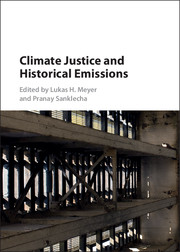Book contents
- Climate Justice and Historical Emissions
- Climate Justice and Historical Emissions
- Copyright page
- Contents
- Contributors
- Introduction
- 1 Climate Ethics, Affirmative Action, and Unjust Enrichment
- 2 Historical Responsibility and Climate Change
- 3 Historical Emissions
- 4 How Legal Systems Deal with Issues of Responsibility for Past Harmful Behavior
- 5 Asking Beneficiaries to Pay for Past Pollution
- 6 Benefiting from Unjust Acts and Benefiting from Injustice
- 7 A Luck-Based Moral Defense of Grandfathering
- 8 In Defense of Emissions Egalitarianism?
- 9 In the Name of Political Possibility
- 10 Right to Development and Historical Emissions
- Index
- References
10 - Right to Development and Historical Emissions
A Perspective from the Particularly Vulnerable Countries
Published online by Cambridge University Press: 23 February 2017
- Climate Justice and Historical Emissions
- Climate Justice and Historical Emissions
- Copyright page
- Contents
- Contributors
- Introduction
- 1 Climate Ethics, Affirmative Action, and Unjust Enrichment
- 2 Historical Responsibility and Climate Change
- 3 Historical Emissions
- 4 How Legal Systems Deal with Issues of Responsibility for Past Harmful Behavior
- 5 Asking Beneficiaries to Pay for Past Pollution
- 6 Benefiting from Unjust Acts and Benefiting from Injustice
- 7 A Luck-Based Moral Defense of Grandfathering
- 8 In Defense of Emissions Egalitarianism?
- 9 In the Name of Political Possibility
- 10 Right to Development and Historical Emissions
- Index
- References
Summary
- Type
- Chapter
- Information
- Climate Justice and Historical Emissions , pp. 219 - 249Publisher: Cambridge University PressPrint publication year: 2017
References
- 1
- Cited by

